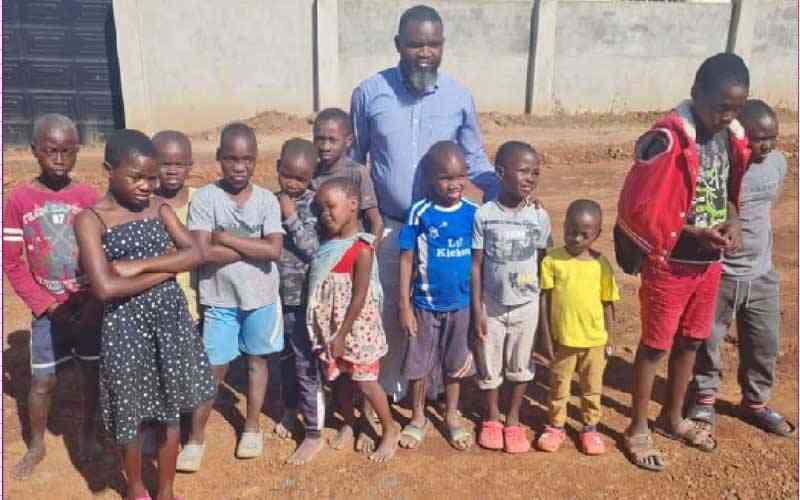
Shorai “Samaita” Mutasa, born 1978, was orphaned early. He was four-years old when he lost both his parents. He was lucky that a close relative took him into her home and looked after him until adulthood. The woman is a person of some means so Mutasa grew up quite comfortably. But he developed a keen interest in the plight of orphans and decided that he had to help if he could.
“I grew up comfortably,” he says. “My niece took good care of me; but when I look back I shudder to think what could have become of me if I had not been taken in by her family.”
He developed a passion for taking care of orphans who have not been as lucky as he.
“Many orphans are headed into orphanages or homes,” he says, “but those are like prisons. We don’t want children to grow up in institutions that resemble prisons.”
He explains the concept of fostering: “Children should be placed within families where they grow up in an environment where they have guardians who raise them as their children. This concept isn’t new; other people are also using the same concept.”
Pursuant to this ideal, Mutasa formed Child Integration Zimbabwe (CIZ). It is a Private Voluntary Organisation (PVO) which is properly registered and complies with the laws of the country. It has been running since 2017 and has 76 children under its care.
The organisation takes pride in fostering underprivileged children of all ages into families where they are taken good care of.
“We make every effort to foster the children into families that are stable where their guardians are ready to raise them as their own children.”
- Makhadzi falls in love with Zim
- Makhadzi tickets go on sale
- Graft allegations rock top NGO
- 2 Kings unveils Makhadzi’s weekend package
Keep Reading
But the guardians need support.
“We don’t just dump the children into these families,” he explains. “We have to support the families, wherever and whenever we can. So we identify orphaned children and then identify the families into which we can foster them.”
CIZ provides food, uniforms and pays the children’s school fees and their health expenses.
“We even pay for extra lessons if need be.”
Unlike orphanages that keep the children in an enclosed space, CIZ gives the children guardians who look after them in a normal community setup.
Asked how the project is funded Mutasa says they are funded by well-wishers.
“There are some families that have volunteered to provide the basic necessities.”
Most of the children under CIZ are in Epworth; 46 are going to school while 30 are not. The majority going to school are enrolled at Domboramwari Primary School in Epworth.
“When I first started, I did not know what to do. My mentor, Dumisani Mutatiwa, offered me assistance because he had been in that business for a long time. Up to date he still provides the families with maize from his farm.”
The business family that runs Jongwe Corner in Hatfield has been very helpful, Mutasa says. “They have been paying school fees for the children. In December last year they brought South African music sensation Makhadzi to Harare and with the proceeds of the show they threw a Christmas party for the kids. These men have been relentlessly trying to get the project to be self-sustaining.”
For sustainability purposes the CIZ has been given some land to erect a greenhouse.
“The children were afforded a piece of land at Domboramwari Primary School to start a greenhouse project. It is our wish that the project eventually helps the kids with their basic needs. The project will cater for their transport, food and clothes as well as afford them life skills that will make them self-sufficient. The project will teach the kids how to farm, which is an important life skill,” Mutasa says.
Mutasa pins all his hope on the success of the horticultural project.
“The project is a horticultural project that needs a greenhouse,” he says appealing to well-wishers. ”Luckily we have secured most of the equipment but there are still funding needs for labour among other issues,” he adds.
The organisation has been doing different fund-raising activities.
“Last year we organised a charity golf tournament at Chapman Golf Club which was a resounding success,” he says. “We thank God we got most of what we wanted; the plastic, the seeds and the drip irrigation kits. A borehole was drilled for us and a pump was donated by one of the golf players,” Mutasa said.
The organisation has a golf tournament scheduled for March at Falcon Golf Club in Hatfield.
Mutatiwa reiterated that the organisation was striving to provide the best facilities for the children.
“We prefer that these children stay in a community where they can adjust to their surroundings. Most children from orphanages fail to adjust to the real world when they are released and end up resorting to drugs. Together with other facilities, we have an open desk phone call service available to all fostering guardians.
This is to assist them in case they need help during odd hours,” explained Mutatiwa.
Mutasa says he wishes to spread the project countrywide because he is aware of the thousands of orphans out there who need help. He says though, the project is everyone’s responsibility.
“I call upon volunteers to come and join the project. Most importantly, the project will need funding from well-wishers.”
Parallels have been drawn between the humble roots of the Mutasa’s CIZ and the Jairosi Jiri Association, a philanthropic organisation set up in 1950 in Bulawayo, to support and train disadvantaged people.
The founder, Jairos Jiri, using Christian principles, wanted to help individuals who previously had been marginalised and rejected. It grew into an internationally renowned organisation that helped thousands of people to be rehabilitated into society.






